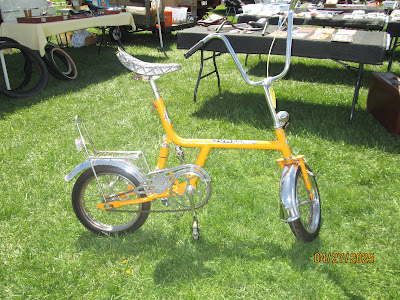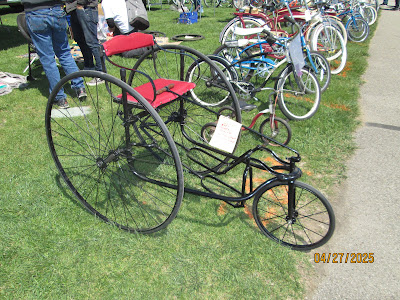By Mike Eliasohn
Officially it is, or was, the 43rd annual Monroe Classic Bicycle and Minibike Show, Swap Meet and Auction, on Sunday, April 27, but the fourth at the Monroe County fairgrounds, just west of Monroe.
Before then, the event, under different operators, was held at the Washtenaw County fairgrounds between Ann Arbor and Saline.
Most bicycles sold at the show are in the collectible category, though I'm sure there were some great bargains there for people looking simply for something to ride. I did encounter someone who bought a bare carbon fiber road bike frame. He let me hold it; it was lighter than some books I own.
This year, the show was not for people looking for a recumbent. I saw only two, both tricycles and one of them intended for kids.
This was the second year that I got free space to try to sell my bicycle books and stuff, thanks to Brian Pikielek, owner of BikeTech bicycle shop in Detroit (biketechdetroit.com), who had indoor and outdoor vendor spaces and lots of bikes and parts to sell. So I stayed outside, and if anyone was interested in any of Brian's bikes, I found Brian.
Unlike last year, I did sell some books and magazines (bicycle and automotive) and some accessories, so happily drove home to just north of Port Huron with less than I brought.
I took some photos on set-up day on Saturday, hence few people around.
A mid-1980s Huffy Slingshot. The cranks power the front wheel, while rear wheels, controlled by the two hand levers, do the steering. Wheels are 14-inch. Asking price was $225.
A 1941 Firestone brand bike, made by Colson in Elyria, Ohio. Asking price was $700. The Colson Co. manufactured bicycles from 1917-53, with its two biggest customers Firestone and Goodyear. (Old-timers will remember when various tire brands operated stores selling automotive tires, of course, bicycles and bicycle tires and other merchandise.) Colson then sold its bike building business to Evans Products, which stopped making bikes in 1962.
An early 1960s Five Rams from China. It doesn't fold; rather the front assembly via the rectangular top tube slides to the rear to drastically shorten the bike for transporting or storage. 16-inch wheels. I neglected to ask the price.
Replacing a banana seat can be expensive. These weren't priced, but those on an adjacent table were priced from $75-$250.
A Puppy (or maybe Road Puppy) folding bike. Tires are 16x1.6 (40-305). From what I found online, these were made by Shimura Seiki Co. and were a civilian version of bikes used by Japanese paratroopers in World War II .
The bicycle show inside the Expo Center is a small part of the overall event. Judging takes place in several categories. The red bike (above) with white tires is a 1966 Raleigh RSW 16.
This is a 1972 Staiger (German brand) Jumbo Jet with rear suspension. Saddle and handlebars are not original. 16-inch wheels. The bike does not fold. Presumably the bike was intended for people, such as apartment dwellers, who did not much storage space.
An EZ Tadpole, which was the only other recumbent I saw. I neglected to write the price.
A product of J&B, the nation's largest distributor to bike shops of bikes and bike parts, its recumbent 2- and 3-wheelers now use the Sunseeker brand name. The current equivalent of this trike is the EZ-Tad SX, retail price $2,020.
A treadle drive tricycle from the 1890s. Rear wheels are 34 inch; front, 16-inch, with solid tires. Seat position is adjustable. Asking price was $500.












No comments:
Post a Comment